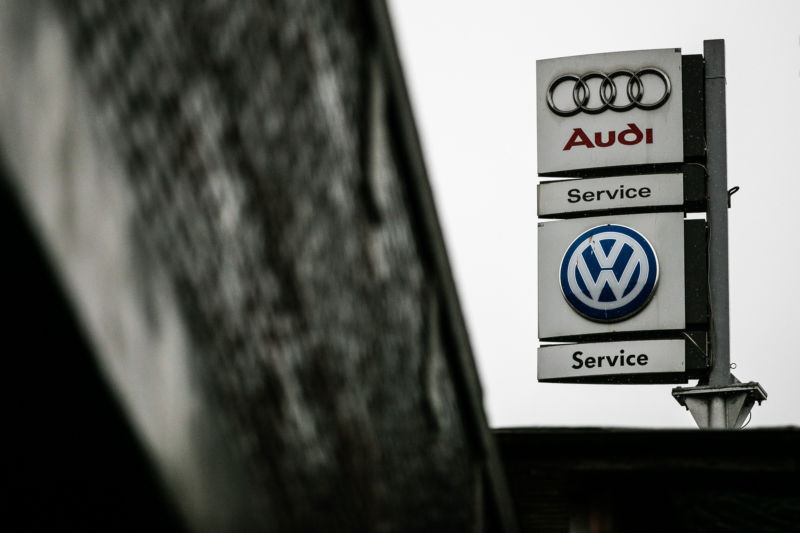
On Thursday, a federal grand jury in Detroit, Michigan, indicted four Audi executives for playing a role in the diesel cheating scandals that rocked parent company Volkswagen Group in 2015 and 2016. The four executives—Richard Bauder, Axel Eiser, Stefan Knirsch, and Carsten Nagel—all worked for Audi in Germany, and they have not been arrested.
The four men have been charged (PDF) with conspiracy to defraud the United States, commit wire fraud, and violate the Clean Air Act.
The indictment offered some new details on how emissions cheating unfolded at Audi and VW Group, especially with respect to emissions control system cheats on Audi’s 3.0L diesel vehicles.
Luxury specifications, budget emissions control
It all started with conflicting constraints on the design of a 3.0L Audi vehicle. Design began in 2006.
Reportedly, Audi engineers were struggling to make a car that could meet the US’ diesel emissions standards and include a big enough AdBlue tank that the fluid would only have to be replaced every 10,000 miles. (AdBlue is a urea mixture that is injected into diesel exhaust to reduce the amount of nitrogen oxide that comes out of the tail pipe). To meet the 10,000-mile requirement, the AdBlue tank would have to encroach on some of the car’s interior, and Audi wanted vehicles with a large trunk and a high-end sound system.
The indictment states that Bauder, the head of Audi’s Diesel Engine Development department, as well as previously indicted Audi manager Giovanni Pamio and other employees, “realized they could not calibrate a diesel engine that would meet the strict NOx emissions standards in the United States and the 10,000 mile refilling interval within the design constraints imposed by Audi.”
Instead, the executives came up with a “dosing strategy” that regulated how the AdBlue was injected into the exhaust. When the car sensed it was attached to a dynamometer (a tool used for vehicle testing in the US), it “dosed AdBlue at higher levels, ensuring compliance with US NOx emissions standards,” the indictment said. However, “during regular driving, the vehicle dosed AdBlue substantially less, which resulted in higher NOx emissions but ensured the AdBlue tanks would not run unacceptably low prior to reaching the 10,000 mile service interval.”
Panic at Audi HQ
The indictment lists a number of times that the four executives listed above could have intervened in the clearly illegal scheme. In 2010 and again in 2012, an Audi employee in the Registration and Testing department told Eiser, a manager in Audi’s Diesel Engine Development department, that dosing was against US law.
In 2013, employees alerted Knirsch, another engine development manager, to the illegal AdBlue scheme in 3.0L vehicles. Knirsch allegedly “directed the Audi employees from the Registration and Testing Department to assess the risks of being caught cheating by US authorities.”
Then, US authorities started to become suspicious. In 2014, researchers at West Virginia University, who were funded by the International Council on Clean Transportation (ICCT), found that VW vehicles were emitting far more than the allowable levels of NOx under real-world driving conditions. This research was sent to the Environmental Protection Agency (EPA) and California’s Air Resources Board (CARB), which has a separate authority to certify vehicles for use in California.
In April 2014, a VW employee attended a conference at which the ICCT study was presented, and the employee wrote to Nagel, the head of engine registration in Audi’s Registration and Testing department, saying that “[s]ome presenters indicated that they suspected cheating, where the vehicle recognizes it is [on] a dyno and runs different calibration [than] what it runs in actual driving. We will have to be careful with this going forward.”
In January, 2015, CARB told VW Group and Audi that CARB would not certify model year 2016 3.0L vehicles until Audi could prove that the cars didn’t have the same emissions issues as the 2.0L vehicles.
Yesterday’s indictment says that in response to this news from CARB, Oliver Schmidt, the general manager in charge of emissions compliance for VW Group, sent an email to Knirsch, telling him that “our worst fears have come true” and that “we urgently need help with arguments.” Schmidt is one of the few VW Group managers who has actually been arrested, tried, and sentenced. He was sentenced to seven years in prison in December 2017.
https://arstechnica.com/?p=1443461

